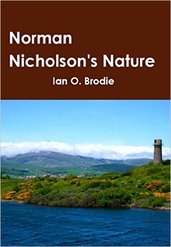Norman Nicholson's Nature
|
|
Ian Brodie is the former Director of the Friends of the Lake District and a campaigner for access to the landscape, for landscape conservation and for nature conservation. He has written a series of walking books, including one on walks around Furness and the Duddon which had a foreword by Norman Nicholson. Other books include Thirlmere and the Emergence of the Landscape Protection Movement (2012), and Why National Parks? (2013), both important texts for those who want to understand the history and future of landscape protection and conservation.
Brodie’s book on Nicholson’s Nature may, at first sight, seem like a new venture into literary studies for this writer, but it is in fact clear that his interest in Nicholson is of very long standing. He tells us that Nicholson ‘was a paid-up member of at least two local conservation organisations, the Friends of the Lake District (FLD) and […] the Cumbria Wildlife Trust (CWT)’ (p. 56). Indeed, Norman, as Brodie feels he must call him, thus signalling his affection for and familiarity with the older writer, was ‘a founder member’ of the CWT (ibid.). Brodie emphasises the fact that although Norman did not agree with these organisations in every respect, he had ‘a general empathy for the aims and objectives of these charities, landscape and nature conservation bodies respectively’ (ibid.). In some cases his opinions—especially with regard to the industrial landscape—were diametrically opposed to these organisations, particularly the FLD, but nevertheless these views ‘never caused him to waver in his fundamental support for the need to conserve and enhance the special natural and landscape qualities of the greater Lake District’ (ibid.). This information is of great interest to those of us who have long stressed Nicholson’s ecological and environmental credentials, and lends support to Kathleen Jones’ insistence at the end of her biography of Nicholson that ‘Norman is now recognised as an environmental writer of some significance’ (Jones 2013: 232). Just before and after the Centenary Year there were several publications of interest to Nicholson readers: the two biographies (Kathleen’s, as mentioned above, and David Boyd’s), as well as a new collection of essays and articles about Nicholson and his work (Norman Nicholson At 100, edited by Stephen Matthews and Neil Curry). This book, however, with its specialist focus, is well worth adding to the collection. It is a methodical and highly knowledgeable exploration of all the important aspects of nature which engrossed Nicholson throughout his writing life. The division of the book into chapters dealing with such broad themes as Geology and Geomorphology, The Industrial Landscape, The Rural Landscape, Landscape Change, followed by the specifics of The Primitive Plants (‘mosses, liverworts, algae and ferns, along with the inaccurately labelled part of the plant kingdom, the fungi’ - p. 61), The Flowering Plants, Fauna—and then the more literary Metaphor and Nature and Humanity—displays the precision and accuracy of Brodie’s examination of the influence of nature on Nicholson’s work. But this is not a dry, scientific exposition of the writings—the book is suffused throughout with a clear love of Nicholson’s observational abilities and of the words of both his poems and his prose. The quotations which head each chapter are a delight to read, and effectively form a mini-anthology of Nicholson’s lively and inventive transformation of what he sees, experiences, and understands into language: ‘simple as a sample of mountain’; ‘crags of slag, acres of brick’; ‘high on the corried slopes’; ‘the spore box of the moss’; ‘wings in a flummox of feathers’. The index, too, is evidence of a labour of love—the list of places, plants, birds and other creatures, and especially the books and poems, showing clear evidence of how thoroughly Brodie knows the work and the man. I have some slight reservations about the proofreading and editing of the book, but these are mere quibbles. The book is a treasure which will help those of us who are less expert in the natural world to see and perceive in Nicholson’s writings what Brodie himself has found there. AF |
